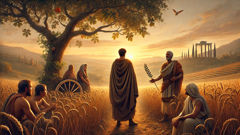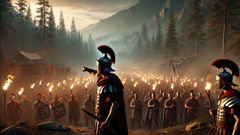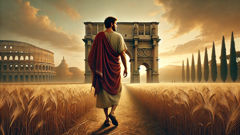Introduction
In the rolling countryside outside the city of Rome, where the gentle Tiber flows past fields of ripening wheat and the air hums with the sound of cicadas, a legend was born that would echo across centuries. It is a story that begins not in the grand halls of marble palaces or amidst the clangor of armies, but in the simple furrows of a Roman farm. Here, under the wide Italian sky, Lucius Quinctius Cincinnatus—known simply as Cincinnatus—lived a life of quiet diligence, his hands calloused by labor, his spirit bound to the land he tended. To his neighbors, he was a man of honor and stern principle, a citizen whose word carried weight even among senators. Yet few could have guessed that the fate of Rome itself would one day rest on his shoulders. In an era where ambition often poisoned the hearts of the powerful, Cincinnatus seemed a relic from another time—a man who cherished duty above glory, who saw leadership not as a prize, but as a burden to be shouldered for the good of all. His tale is woven from the fabric of history and legend, an enduring reminder that true greatness lies not in conquest, but in the wisdom to know when to yield. On this farm, in the tranquil hush before dawn, Rome’s most reluctant hero would soon be summoned, not for his own sake, but for the salvation of a city that desperately needed him.
Fields of Duty: The Humble Life of Cincinnatus
The heart of Cincinnatus’s world was his land—rough and stony, yielding only to patient toil. Each dawn found him awake before the birds, coaxing life from the earth. The sweat on his brow and the ache in his back were wages he gladly paid for the promise of harvest. His home was modest, built of sunbaked brick and timber, shaded by an old fig tree whose twisted branches had witnessed more seasons than any living soul in the village. Though once a senator, Cincinnatus’s fortunes had faded. Political intrigues in Rome had forced him from the city, and he bore the injustice with a stoic calm, finding solace in honest work and the love of his family. His wife Racilia, steadfast and wise, matched his strength with her own quiet resilience. Together, they shaped a life of integrity—a contrast to the swirling ambition of the capital.

Neighbors often sought Cincinnatus’s counsel when disputes arose. He spoke rarely but listened well, his words carrying the weight of a man who measured every judgment against a greater good. In evenings, when the chores were done, he would sit beneath the fig tree, recounting tales of old Rome to his son, Caeso. His stories were not of conquests, but of laws and virtues, of justice and sacrifice. The values of discipline, humility, and loyalty ran through his veins, as much a part of him as the soil he tilled.
But even as Cincinnatus found contentment in the rhythm of seasons, Rome itself was restless. Factions vied for power; corruption gnawed at the heart of the Senate. Beyond the city walls, danger loomed. The Aequi, a fierce tribe from the Apennines, had grown bold, emboldened by Rome’s internal strife. Their raids threatened villages, their horsemen cast long shadows over peaceful fields. Whispers of invasion traveled along the Via Salaria, sowing fear among farmers and merchants alike.
One spring morning, as Cincinnatus guided his oxen across the new-sown furrows, a messenger approached, dust-caked and desperate. The man carried with him a laurel branch—the symbol of urgent need—and news that would alter the course of history. Rome was besieged. An entire consular army, led by Consul Minucius, was trapped in the narrow valleys near Mount Algidus. The Senate had argued for days, paralyzed by indecision and rivalry, until at last they agreed: only a man untainted by ambition, one whose loyalty was beyond doubt, could be trusted with supreme command. Cincinnatus, farmer and exile, was their last hope.
The messenger delivered his summons. At first, Cincinnatus could only stare, stunned by the magnitude of the request. To leave his fields now, at the very start of the season, meant risking everything his family depended on. Yet Racilia met his eyes with unwavering support. “Rome needs you,” she said softly. With a heavy heart, Cincinnatus laid aside his plow. He washed the dust from his hands, donned the crimson-bordered toga of command, and stepped forward—not as a conqueror, but as a servant to the Republic.
Crisis at Mount Algidus: The Dictator’s Mantle
The journey from field to Forum was swift and somber. Word spread like wildfire: Cincinnatus, the farmer-senator, had been called to serve as dictator—a role reserved for Rome’s darkest hours, granting absolute power for a brief, desperate period. As he entered the city, crowds lined the streets. Some cheered, recalling his reputation for virtue; others watched warily, haunted by memories of past dictators who’d clung to power long after their mandate had ended. Cincinnatus met their eyes with calm resolve, unmoved by praise or suspicion.

He convened the Senate without delay. The room, thick with tension and the smell of lamp oil, was filled with men accustomed to arguing their own interests. Cincinnatus’s voice cut through the noise: “The Republic is greater than any one man. We stand or fall together.” His authority brooked no challenge. He appointed Lucius Tarquitius as his Master of the Horse and issued orders for every able-bodied man to assemble at the Field of Mars by sunset—no time wasted on speeches or ceremony. The city hummed with purpose. Blacksmiths hammered swords and shields through the night; mothers sewed standards and baked loaves for the march. Young men who’d never seen battle steeled themselves for what lay ahead.
As dusk bled into darkness, the newly raised army set out. Cincinnatus marched at their head—not atop a gilded chariot, but on foot, clad in battered armor. The road to Mount Algidus was perilous, lined with ancient oaks and haunted by the threat of ambush. Scouts returned with grim news: the Aequi had encircled Minucius’s army, fortifying their camp with walls of timber and trenches bristling with stakes. The trapped Romans were starving, hope slipping away with each day.
Upon reaching the battlefield, Cincinnatus wasted no time. He ordered his soldiers to cut stakes from the forest and construct a wall around the Aequi’s position—encircling the enemy who had encircled the Romans. Fires burned through the night as the men labored in silence, sweat mingling with fear and anticipation. Cincinnatus moved among them, offering steady words and sharing their burdens. His presence inspired confidence; his strategy was bold and unexpected.
At dawn, the Aequi awoke to find themselves surrounded. Panic rippled through their ranks. Trapped between two Roman armies, their only hope lay in desperate assault. The ensuing battle was fierce—spears clashed, shields splintered, cries echoed through the mist. Cincinnatus fought at the front, his sword flashing in the golden light. His leadership turned the tide; by nightfall, the Aequi surrendered, their chiefs brought in chains before the Roman standard. The siege was lifted, Minucius and his battered soldiers freed. The victors returned to Rome not with spoils of war, but with gratitude for a leader who had asked nothing for himself.
Return to the Plow: Legacy and Lessons of Humility
The celebrations in Rome were jubilant. The Senate hailed Cincinnatus as savior; crowds pressed in, showering him with olive wreaths and songs. Senators urged him to remain dictator, to steer Rome through its ongoing crises. Their words were honeyed with flattery, promising estates, titles, and perpetual power. But Cincinnatus listened politely and shook his head. He called for silence in the Forum, his voice ringing with quiet authority: “I accepted this command not for glory or reward, but because Rome called. The danger has passed; so too must my authority.”

He relinquished his title on the very day the Aequi surrendered—after just sixteen days of absolute power. His decision stunned the city. Where others had grasped at office until forced out, Cincinnatus stepped aside voluntarily, returning the reins of government to the Senate and the consuls. He refused all gifts save one: a new plow, presented by grateful citizens. With little ceremony, he walked from the Forum back to his farm, his crimson-bordered toga replaced once more by a homespun tunic.
Life returned to its familiar rhythms. The fields were still there to be tilled; Racilia greeted him with a smile, and Caeso listened eagerly to new stories. Yet something in the air had changed. Word of Cincinnatus’s selflessness spread beyond Rome’s walls—across Italy, to Greece, and even as far as distant Carthage. Ambassadors came to see the farmer who had refused a crown, seeking the secret of Rome’s resilience.
In time, Rome faced new threats. Decades later, once again beset by enemies and political turmoil, the Senate called upon Cincinnatus. Once again, he left his plow to take up the mantle of dictator. And once again, he saved the city—always returning to his land when peace was restored. His humility became legend, a living rebuke to ambition run amok. Young Romans learned his name alongside Romulus and Remus, not for battles won, but for wisdom shown in relinquishing power.
Cincinnatus’s legacy endured long after his death. In marble halls and dusty fields, his story was retold—a reminder that true leadership is rooted in service, not self-interest. Generations looked to him as a model of virtue: a man who understood that the greatest victories are sometimes those that leave no trace but in the hearts of people inspired to act justly. Even today, as empires rise and fall, the plow of Cincinnatus stands as a symbol—a simple tool that changed the course of history.
Conclusion
The story of Cincinnatus endures not merely because he was a hero, but because he chose humility over pride, service over ambition. In a world often dazzled by displays of power, he showed that wisdom lies in knowing when to step aside and trust others to lead. His actions shaped Rome’s destiny, but his example shaped something greater—the idea that greatness springs from selflessness. Cincinnatus’s legacy lives wherever leaders act for the common good and ordinary people rise to meet extraordinary challenges. His plow remains a timeless symbol, whispering that sometimes, the most profound victories are won not in battlefields or palaces, but in the quiet courage to do what is right and then return, content, to the life that truly matters.













